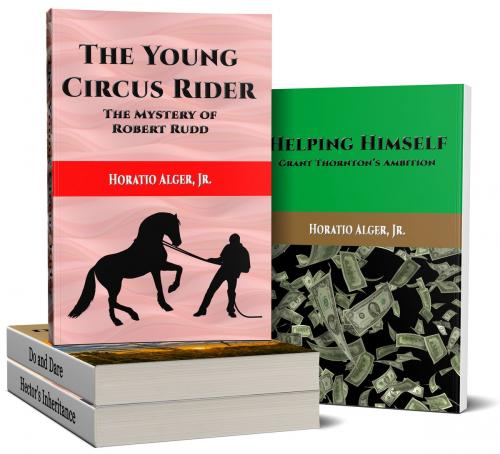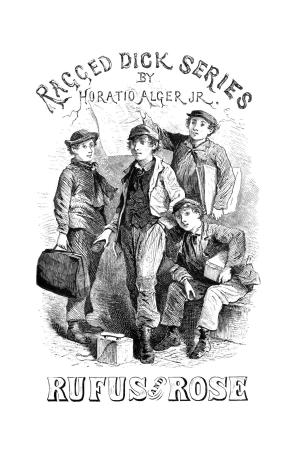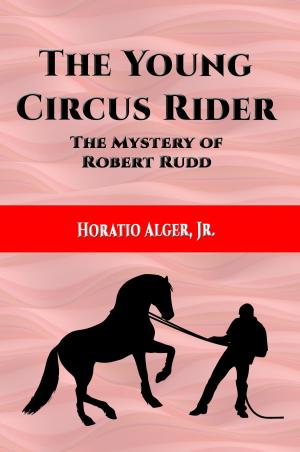| Author: | Horatio Alger, Jr. | ISBN: | 1230003246436 |
| Publisher: | Reading Bear Publications | Publication: | May 26, 2019 |
| Imprint: | Language: | English |
| Author: | Horatio Alger, Jr. |
| ISBN: | 1230003246436 |
| Publisher: | Reading Bear Publications |
| Publication: | May 26, 2019 |
| Imprint: | |
| Language: | English |
Atlantic Series, by Horatio Alger, Jr., consists of four novels:
1. The Young Circus Rider tells the story of Robert Rudd who at nine years old wandering the country alone when he was offered a job as a circus rider. He accepted, and as the book opens, he is 15, and still riding circus horses. A jealous fellow performer throws a rock as Robert's horse, causing Robert to fall, the accident ending his circus days. Robert and his friend Anak, a Norweigan giant travel the country encountering many dangers and having many adventures until....
2. Do and Dare is the story of Herbert Carr, the son of a war widow who had assumed her husband's place as postmaster of the small rural town in Wayneboro. Squire Walsingham uses his political influence to take the post away from the widow and put into the hands of his nephew, Ebenezer Graham, the local miser and shopkeeper. Graham hires Herbert for a pittance to run things until he learns what must be done. When his son returns from Boston, Graham fires Herbert and hires his son. Herbert encounters many trials and tribulations throughout the rest of the book.
3. Hector's Inheritance tells the tale of Hector Roscoe, whose uncle does everything in his power to cheat Hector out of his rightful inheritance. At the time he was saving his money, Hector regarded himself as the heir and future possessor of a large estate, and had no expectation of ever needing the money he was saving. It had been in his mind that it would give him an opportuniy of helping, out of his private funds, any deserving poor person who might apply to him. When his uncle made the unexpected revelation that he had no claim to the estate, he was glad that he was not quite penniless. Wisely, Hector does not believe his uncle, and sets out to prove his claim.
4. Helping Himself: In order to pay his minister father's debts, young Grant Thornton postpones his college education to take a job as a Wall Street broker's clerk. When his family owes a debt of some $260, Mrs. Thornton decides to sell her pearl necklace and bracelets. She sends Grant to New York City to sell the jewels to Mr. Clifton for $400. Grant makes a second trip to New York to see Mr. Henry Reynold, a stock broker. While living in Mr. Reynold's home, Grant is accused of stealing $1,000 in bonds. Willis, also an employee of Mr. Reynold, is eventually exposed as the thief and is fired. However he in turn abducts Mr. Reynold's son, Herbert, taking him to Illinois. Grant must travel to across the country to Illinois to rescue the boy.
Horatio Alger, Jr. (January 13, 1832 – July 18, 1899) was a prolific 19th-century American author, best known for his many formulaic juvenile novels about impoverished boys and their rise from humble backgrounds to lives of middle-class security and comfort through hard work, determination, courage, and honesty. His writings were characterized by the "rags-to-riches" narrative, which had a formative effect on America during the Gilded Age.
Atlantic Series, by Horatio Alger, Jr., consists of four novels:
1. The Young Circus Rider tells the story of Robert Rudd who at nine years old wandering the country alone when he was offered a job as a circus rider. He accepted, and as the book opens, he is 15, and still riding circus horses. A jealous fellow performer throws a rock as Robert's horse, causing Robert to fall, the accident ending his circus days. Robert and his friend Anak, a Norweigan giant travel the country encountering many dangers and having many adventures until....
2. Do and Dare is the story of Herbert Carr, the son of a war widow who had assumed her husband's place as postmaster of the small rural town in Wayneboro. Squire Walsingham uses his political influence to take the post away from the widow and put into the hands of his nephew, Ebenezer Graham, the local miser and shopkeeper. Graham hires Herbert for a pittance to run things until he learns what must be done. When his son returns from Boston, Graham fires Herbert and hires his son. Herbert encounters many trials and tribulations throughout the rest of the book.
3. Hector's Inheritance tells the tale of Hector Roscoe, whose uncle does everything in his power to cheat Hector out of his rightful inheritance. At the time he was saving his money, Hector regarded himself as the heir and future possessor of a large estate, and had no expectation of ever needing the money he was saving. It had been in his mind that it would give him an opportuniy of helping, out of his private funds, any deserving poor person who might apply to him. When his uncle made the unexpected revelation that he had no claim to the estate, he was glad that he was not quite penniless. Wisely, Hector does not believe his uncle, and sets out to prove his claim.
4. Helping Himself: In order to pay his minister father's debts, young Grant Thornton postpones his college education to take a job as a Wall Street broker's clerk. When his family owes a debt of some $260, Mrs. Thornton decides to sell her pearl necklace and bracelets. She sends Grant to New York City to sell the jewels to Mr. Clifton for $400. Grant makes a second trip to New York to see Mr. Henry Reynold, a stock broker. While living in Mr. Reynold's home, Grant is accused of stealing $1,000 in bonds. Willis, also an employee of Mr. Reynold, is eventually exposed as the thief and is fired. However he in turn abducts Mr. Reynold's son, Herbert, taking him to Illinois. Grant must travel to across the country to Illinois to rescue the boy.
Horatio Alger, Jr. (January 13, 1832 – July 18, 1899) was a prolific 19th-century American author, best known for his many formulaic juvenile novels about impoverished boys and their rise from humble backgrounds to lives of middle-class security and comfort through hard work, determination, courage, and honesty. His writings were characterized by the "rags-to-riches" narrative, which had a formative effect on America during the Gilded Age.















